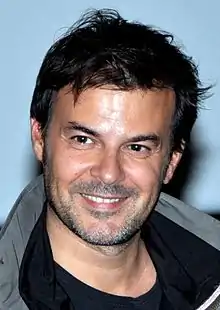François Ozon
François Ozon (French: [fʁɑ̃.swa o.zɔ̃]; born 15 November 1967) is a French film director and screenwriter whose films are usually characterized by sharp satirical wit and a freewheeling view on human sexuality.
François Ozon | |
|---|---|
 Ozon in 2012 | |
| Born | 15 November 1967 Paris, France |
| Alma mater | La Femis |
| Occupation | Filmmaker |
| Years active | 1988–present |
| Website | www |
He has achieved international acclaim for his films 8 femmes (2002) and Swimming Pool (2003). Ozon is considered to be one of the most important French film directors in the new "New Wave" in French cinema such as Jean-Paul Civeyrac, Philippe Ramos, and Yves Caumon, as well as a group of French filmmakers associated with a "cinema du corps/cinema of the body".[1]
Life and career
Ozon was born in Paris, France. Having studied directing at the French film school La Femis, Ozon made several short films such as A Summer Dress (Une robe d'été, 1996) and Scènes de lit (1998). His motion picture directing debut was Sitcom (also 1998), which was well received by both critics and audiences.
After the Fassbinder adaptation Water Drops on Burning Rocks (Gouttes d'eau sur pierres brûlantes, 2000) came the film which made his name outside France, 8 Women (8 femmes, 2002), starring Catherine Deneuve, Fanny Ardant, Isabelle Huppert and Emmanuelle Béart. With its quirky mix of musical numbers and murder mystery and a production design harking back to 1950s Hollywood melodramas such as those directed by Douglas Sirk, the film became a huge commercial success.
In 2003, Swimming Pool, which starred Charlotte Rampling and Ludivine Sagnier was released. It was considered by Ozon as a very personal film that gives insight into the difficult process of writing a novel or screenplay.
In 2004 he directed the film 5x2. In 2005 his film Time to Leave (Le Temps qui reste) was screened at various film festivals worldwide.
Ozon's first full English-language production Angel, starring Romola Garai, was released in early 2007. The film, based on a novel by British writer Elizabeth Taylor, follows the story of a poor girl who climbs Edwardian England's social ladder by becoming a romance writer. The film was shot at Tyntesfield House and Estate near Bristol, at other UK locations and in Belgium.
While filming Angel, Ozon developed a strong friendship with Garai and called her his "muse".
His film The Refuge had its world premiere at the Toronto International Film Festival in September 2009.
On 19 December 2011 Ozon was announced as being on the jury for the 62nd Berlin International Film Festival, which was held in February 2012.[2]
His 2013 film Young & Beautiful (Jeune & Jolie) was nominated for the Palme d'Or at the 2013 Cannes Film Festival.[3] Ozon was elected as best screenwriter at the 2013 European Film Awards for his 2012 film In the House.[4]
His 2014 film, The New Girlfriend, premiered at the Toronto International Film Festival in September 2014.[5]
Awards
- 1999: Seattle International Film Festival - Emerging Masters Showcase Award
- 2004: Filmfest Hamburg - Douglas-Sirk-Award
- 2006: Frameline Film Festival - Frameline Award
- 2011: Jameson Dublin International Film Festival - Career Achievement Award
Filmography
References
- Palmer, Tim. "Style and Sensation in the Contemporary French Cinema of the Body" (PDF). Journal of Film and Video (Fall 2006). Archived from the original (PDF) on 2010-06-02. Retrieved 2010-05-17.
- "Berlinale 2012: International Jury". berlinale.de. 2011-12-19. Retrieved 2011-12-21.
- "2013 Official Selection". Cannes. 18 April 2013. Retrieved 18 April 2013.
- "Winners 2013". European Film Awards. European Film Academy. Retrieved 9 December 2013.
- "Toronto film festival 2014 unveils first wave; Little Chaos to close". Screendaily. Retrieved 22 July 2014.
Further reading
- Asibong, Andrew, François Ozon, Manchester University Press (2008) ISBN 0-7190-7423-1
- Badt, Karin, "Francois Ozon's New Thriller Gains Applause at Cannes Despite Shallowness," Huffington Post (2017). http://www.huffingtonpost.com/entry/592736c8e4b03296e2d11342
- Cavitch, Max, "Sex After Death: François Ozon's Libidinal Invasions," Screen 48.3 (2007), 313-26
- Padva, Gilad. "Undressed Masculinities and Disrupted Sexualities in Une Robe d'été" in Grandena, Florian and Johnston, Cristina (Eds.). Cinematic Queerness: Gay and Lesbian Hypervisibility in Contemporary Francophone Feature Films, vol. 2 (Modern French Identities 98) (pp. 215–225). Oxford and New York: Peter Lang (2011).
- Palmer, Tim, "Style and Sensation in the Contemporary French Cinema of the Body," Journal of Film and Video 58.3 (2006), 22-32
- Rees-Roberts, Nick. French Queer Cinema, Edinburgh University Press (2008) ISBN 0-7486-3418-5
- Schilt, Thibaut. François Ozon, University of Illinois Press (2011) ISBN 0-252-07794-6
- Wende, Johannes (Ed.), François Ozon, edition text + kritik (2016) ISBN 978-3-86916-511-0
External links
| Wikimedia Commons has media related to François Ozon. |
